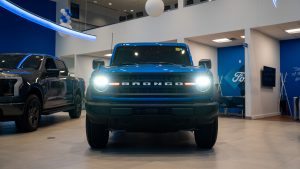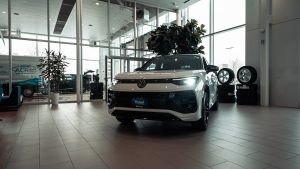Worried about EV performance in cold weather? Here’s what Manitoba drivers need to know.
Do electric vehicles work in cold Canadian winters? It’s one of the most common questions from drivers across Manitoba—and the short answer is yes. While cold weather can affect range and charging speed, today’s EVs are more winter-ready than ever. In this blog, we’re clearing up five common EV winter myths—so you can make an informed decision about going electric in Canada’s coldest months.

Myth 1: “EVs don’t work in cold weather.”
While cold temperatures can temporarily reduce range, EVs absolutely do work in the winter. Most modern EVs are built with cold-weather packages including battery thermal management systems, preconditioning features, and heat pumps—all designed to help the vehicle perform more efficiently in sub-zero conditions.
Myth 2: “You can’t charge an EV when it’s freezing.”
False. You can charge in the cold—it just may take slightly longer. Many EVs allow you to preheat the battery before charging, which helps reduce wait times and improves efficiency. Plus, more public chargers are becoming winter-optimized, especially in colder provinces like Manitoba.
Myth 3: “Driving an EV in winter is dangerous.”
Not at all. In fact, EVs tend to have a lower center of gravity because of their battery placement, which can enhance stability on icy roads. And just like gas-powered vehicles, winter tires make all the difference. Equip your EV properly and you’ll be just as safe—if not safer—on winter roads.
Myth 4: “You’ll be stuck without heat to save range.”
No one’s asking you to freeze. While running the cabin heater can impact range slightly, most EVs now use efficient heat pump systems to maximize warmth with minimal energy draw. And with remote pre-conditioning, you can warm your vehicle before unplugging—so you’re cozy and ready to roll.
Myth 5: “EVs aren’t practical for long winter drives.”
It depends on your route, but this is becoming less true every year. With better battery ranges, growing charging infrastructure, and smart trip planning, EVs are increasingly suitable for road trips—even in winter. Many drivers comfortably commute and travel within Manitoba using their EV all year long.
Winter EV Frequently Asked Questions:
Q: How much does cold weather affect EV range?
Most EVs lose about 15–30% of range in cold weather, depending on battery size, temperature, and heater usage. Pre-conditioning can help reduce this.
Q: Do all EVs come with cold-weather features?
Most modern EVs offer winter features like heated seats, battery thermal management, and heat pumps—especially Canadian models.
Q: Are EVs safe to drive on Manitoba roads in winter?
Yes. With winter tires and smart driving habits, EVs handle just as well—sometimes better—than gas vehicles thanks to their low centre of gravity and instant torque.
Conclusion: Driving Electric Doesn’t Mean Compromising in Winter
EVs may behave a little differently in the cold—but they’re more than capable of handling Canadian winters. With the right tires, charging habits, and driving strategies, you can confidently drive electric year-round in Manitoba.
Explore Birchwood’s EV Hub for winter tips, EV models, and local incentives.


